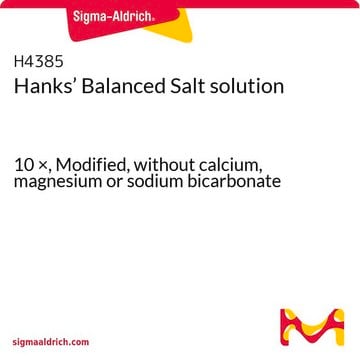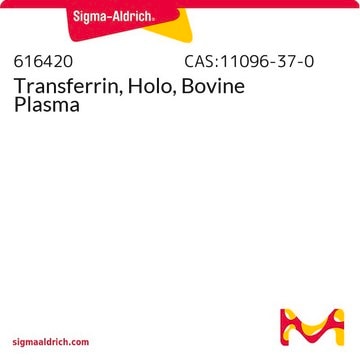H2387
Hanks′ Balanced Salts
Modified, without calcium chloride, magnesium sulfate and sodium bicarbonate, powder, suitable for cell culture
Synonym(s):
HBSS
Sign Into View Organizational & Contract Pricing
All Photos(1)
About This Item
Recommended Products
form
powder
technique(s)
cell culture | mammalian: suitable
storage temp.
2-8°C
Looking for similar products? Visit Product Comparison Guide
General description
Balanced salt solution (BSS) provides cells with water, bulk inorganic ions, and buffering system to maintain the normal cell metabolism and physiological range (pH 7.2-7.6), respectively. It also acts as an irrigating, diluting, and transporting agent and maintains the intracellular and extracellular osmotic balance. BSS also provides energy sources such as glucose for cell metabolism.
Application
Hanks′ Balanced Salt has been used:
- to culture primary hippocampal neuron cells from rats
- to collect the rat brains
- to culture rat primary hepatocytes
Quantity
Formulated to contain 9.5 grams of powder per liter of medium.
Reconstitution
Supplement with 0.35 g/L sodium bicarbonate.
Other Notes
The pH is adjusted after addition of sodium bicarbonate.
supplement
Product No.
Description
Pricing
Storage Class Code
13 - Non Combustible Solids
WGK
WGK 1
Flash Point(F)
Not applicable
Flash Point(C)
Not applicable
Personal Protective Equipment
dust mask type N95 (US), Eyeshields, Gloves
Choose from one of the most recent versions:
Certificates of Analysis (COA)
Lot/Batch Number
Don't see the Right Version?
If you require a particular version, you can look up a specific certificate by the Lot or Batch number.
Already Own This Product?
Find documentation for the products that you have recently purchased in the Document Library.
Customers Also Viewed
Abdelrahman I Rezk et al.
Scientific reports, 9(1), 117-117 (2019-01-16)
Magnesium (Mg) and its alloys have attracted much attention as a promising candidate for degradable implant applications however the rapid corrosion of magnesium inside the human body greatly limits its use as an implant material. Therefore, coating the alloy surface
Yu Bai et al.
Journal of materials science. Materials in medicine, 27(2), 31-31 (2015-12-26)
Au nanoparticles (AuNPs) are successfully assembled on TiO2 nanotube (TN) arrays through electrochemical deposition technology to improve the surface characteristics of TN arrays as an implant material. The loading amount of AuNPs can be controlled by adjusting the deposition time
Bikendra Maharjan et al.
Materials science & engineering. C, Materials for biological applications, 114, 111056-111056 (2020-10-01)
Despite intensive attempts to fabricate polypyrrole nanoparticles (PPy-NPs) incorporated nanofibrous scaffolds, a low-cost facile strategy is still demanded. Herein, we developed a novel strategy- in-situ polymerization of PPy-NPs and immobilized them into the PCL polymeric matrix in a single step.
Seo Yeon Lee et al.
Polymers, 12(2) (2020-02-20)
Herein, we describe precisely a covalent modification of pure magnesium (Mg) surface and its application to induce in vitro osteogenic differentiation. The new concept of a chemical bonding method is proposed for developing stable chemical bonds on the Mg surface
Mostafa M H Ibrahim et al.
ASN neuro, 12, 1759091420974134-1759091420974134 (2020-11-13)
Norepinephrine (NE) control of hypothalamic gluco-regulation involves astrocyte-derived energy fuel supply. In male rats, exogenous NE regulates astrocyte glycogen metabolic enzyme expression in vivo through 5'-AMP-activated protein kinase (AMPK)-dependent mechanisms. Current research utilized a rat hypothalamic astrocyte primary culture model
Protocols
Powdered media and salt mixtures are extremely hygroscopic and should be protected from atmospheric moisture.
Our team of scientists has experience in all areas of research including Life Science, Material Science, Chemical Synthesis, Chromatography, Analytical and many others.
Contact Technical Service







